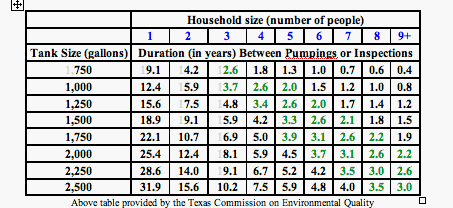
Questions
Applicable to All Types of Septic Systems
Do I need to obtain a permit to repair my septic system?
Yes. With few exceptions, Texas law requires an approved permit to repair
any type of septic system. This law is intended to assure that the person
making the repairs is experienced and understands the correct procedures
and processes for repairing a system. The law is in place to protect the
environment as well as the homeowner and his neighbors.
What is the process for obtaining a repair or installation permit.
In Texas septic system repair and installation permits are issued through
your county health department. The permit application considers the type
of soil, placement of the system relative to creeks, rivers, lakes and
property lines, as well as the type of septic system to be repaired or
replaced and the installation or repair plan. Each county maintains a
list of licensed septic service companies. Because of the potential difficulties
involved in obtaining permits, most service providers require the homeowner
to complete and file the application. In most instances we, at Septic
Solutions, are able to handle these details for our customers.
Can
I flush toilet paper into my system?
All septic systems are designed to properly process toilet paper. The
size of the holding tank is based on the number of bedrooms in the home.
Commercially manufactured toilet paper is are septic system safe. Therefore,
so long as the system is not required to handle more wastewater than it
was designed to handle, there should be no problem using toilet paper.
How often do I need to have my system pumped?
This answer depends on the size of the system and the number of people
using the system. However, for the average household, the answer is every
three to five years.

Do I need to add additives to my system?
In most instances additives are unnecessary to maintain a properly funtioning
septic system. However, sometimes a system will become overloaded with
organic material and the enzymes and bacteria in additives can actually
help. This can occur when a system is temporarily required to process
more waste than it was designed to process, such as instances when their
are frequent large parties or extra guests for an extended period of time.
The need for these supplements is best determined by your service provider.
Questions
Specific to Aerobic Wastewater Treatement Systems
How do I renew my Aerobic System maintenance contract?
Each aerobic system comes with a free, two year maintenance contract that
commences the day the installation process is complete. This service is
initially provided by the installation company. Since most systems are
relatively easily maintained during the first two years, some installers
do not offer maintenance beyond that initial period. It then falls to
the homeowner to find a licensed service provider who is trained and qualified
to maintain the homeowner's specific brand of aerobic system. When you
sign up with Septic Solutions, your maintenance contract is automatically
renewed each year.
What services are provided under by a maintenance contract?
Typical maintenance contracts provide for three system inspections per
year to certify that the system is operating properly. Expenses associated
with repairs, chlorine, and pumping (when required) are the responsibility
of the homeowner
What activities are performed during a routine maintenance visit?
This will vary between service providers. At G2 Ecologic, we inspect and
clean all electrical and mechanical components to ensure proper functionality.
In addition we check the sludge level in your holding tank. Upon completion
of the inspection we provide our customers and the county with a written
report of our findings.
How important are the air and water pumps on an aerobic system?
Both pumps are essential to proper operation of a system. The air pump
is used to aerate the wastewater and speed the processes of decomposition.
The water pump is used to force the discharge water through the spray
lines and onto to the land surface. If either fails to operate properly
the wastewater will turn septic. This may be observed as black, smelly
water being discharged by the system.
Is the water that is discharged by an aerobic system safe?
All commercially certified aerobic systems produce safe water when properly
maintained. The water is treated to kill or eliminate pathogens before
they can be discharged through the spray field. However, the water is
not treated to the level where it is considered safe to drink or drinkable.
How much does chlorine cost per year?
The average family on an aerobic system spends $200 to $300 per year for
chlorine. We offer our customers the option of installing a Smart=Chlor
Liquid Chlorinator that can be operated at a substantial reduction in
chlorine cost.
Why does my aerobic system have an unpleasant odor?
The most common reasons for aerobic system odors are: 1) Overloading the
system with chemicals, 2) the presence of a restriction in the air supply,
3) more wastewater input to the system than it was designed to handle,
and 4) inadequate disinfectant supply. Diagnosing the cause of odors is
a difficult process that is best left to your septic system professional.
How often should I add chlorine?
Adding chlorine is on an "as needed" basis. You should monitor
your system to assure that there are a minimum of 2-3 chlorine tablets
in the tube at all times.
Questions Specific to Non-Aerobic Wastewater Systems
How can I tell where the problem is with my non-aerobic septic
system?
There will be a bad odor and or water will be surfacing and you will have
trouble either taking baths or toilets flushing We are happy to come out
and evaluate your system .
 |
|||
 |
 |
 |